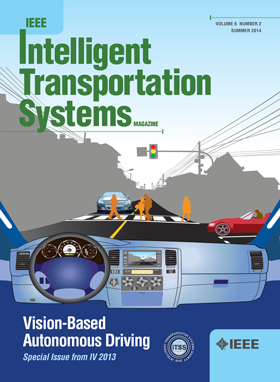pyrtklib:一个用于城市峡谷定位的紧密耦合深度学习和GNSS集成的开源包
IF 8.4
1区 工程技术
Q1 ENGINEERING, CIVIL
IEEE Transactions on Intelligent Transportation Systems
Pub Date : 2025-04-15
DOI:10.1109/TITS.2025.3552691
引用次数: 0
摘要
全球导航卫星系统(GNSS)对于智能交通系统(ITS)至关重要,它提供了必不可少的全球定位能力。然而,在城市峡谷中,由于直接GNSS信号的阻塞,GNSS性能可能会显著下降。伪距测量值受影响较大,传统的加权观测模型不适用于城市峡谷。本文通过将人工智能(AI),特别是深度学习集成到GNSS定位过程中来提高定位精度,从而解决了这些挑战。传统的方法主要集中在伪距校正上,因为缺乏对权值估计的真值。作为回应,我们提出了一种创新的间接训练方法,利用深度学习来优化伪距偏差和权值估计,旨在最大限度地减少定位误差。为了支持这种集成,我们开发了pyrtklib,这是开源RTKLIB工具的Python绑定,弥合了传统GNSS算法(通常用Fortran或C开发)与现代基于Python的AI框架之间的差距。对比分析表明,我们的方法在定位精度上超过了goGPS和RTKLIB等现有工具,标志着该领域的重大进步。紧密耦合深度学习和GNSS集成的源代码,以及pyrtklib,可在GitHub上获得https://github.com/ebhrz/TDL-GNSS和https://github.com/IPNL-POLYU/pyrtklib。本文章由计算机程序翻译,如有差异,请以英文原文为准。
pyrtklib: An Open-Source Package for Tightly Coupled Deep Learning and GNSS Integration for Positioning in Urban Canyons
Global Navigation Satellite Systems (GNSS) are crucial for intelligent transportation systems (ITS), providing essential positioning capabilities globally. However, in urban canyons, the GNSS performance could significantly degraded due to the blockage of direct GNSS signals. The pseudorange measurements are largely affected and the conventional model of weighting observations is not suitable in urban canyons. This paper addresses these challenges by integrating Artificial Intelligence (AI), specifically deep learning, into GNSS positioning process to enhance positioning accuracy. Traditional methods have primarily focused on pseudorange correction due to the absence of ground truth for weight estimation. In response, we propose an innovative indirect training approach using deep learning to optimize both pseudorange bias and weight estimation, aiming to minimize the positioning errors. To support this integration, we developed pyrtklib, a Python binding for the open-source RTKLIB tool, bridging the gap between traditional GNSS algorithms, typically developed in Fortran or C, and modern Python-based AI frameworks. Comparative analyses demonstrate that our method surpasses established tools like goGPS and RTKLIB in positioning accuracy, marking a significant advancement in the field. The source code of tightly coupled deep learning and GNSS integration, along with pyrtklib, is available on GitHub at https://github.com/ebhrz/TDL-GNSS and https://github.com/IPNL-POLYU/pyrtklib .
求助全文
通过发布文献求助,成功后即可免费获取论文全文。
去求助
来源期刊

IEEE Transactions on Intelligent Transportation Systems
工程技术-工程:电子与电气
CiteScore
14.80
自引率
12.90%
发文量
1872
审稿时长
7.5 months
期刊介绍:
The theoretical, experimental and operational aspects of electrical and electronics engineering and information technologies as applied to Intelligent Transportation Systems (ITS). Intelligent Transportation Systems are defined as those systems utilizing synergistic technologies and systems engineering concepts to develop and improve transportation systems of all kinds. The scope of this interdisciplinary activity includes the promotion, consolidation and coordination of ITS technical activities among IEEE entities, and providing a focus for cooperative activities, both internally and externally.
 求助内容:
求助内容: 应助结果提醒方式:
应助结果提醒方式:


